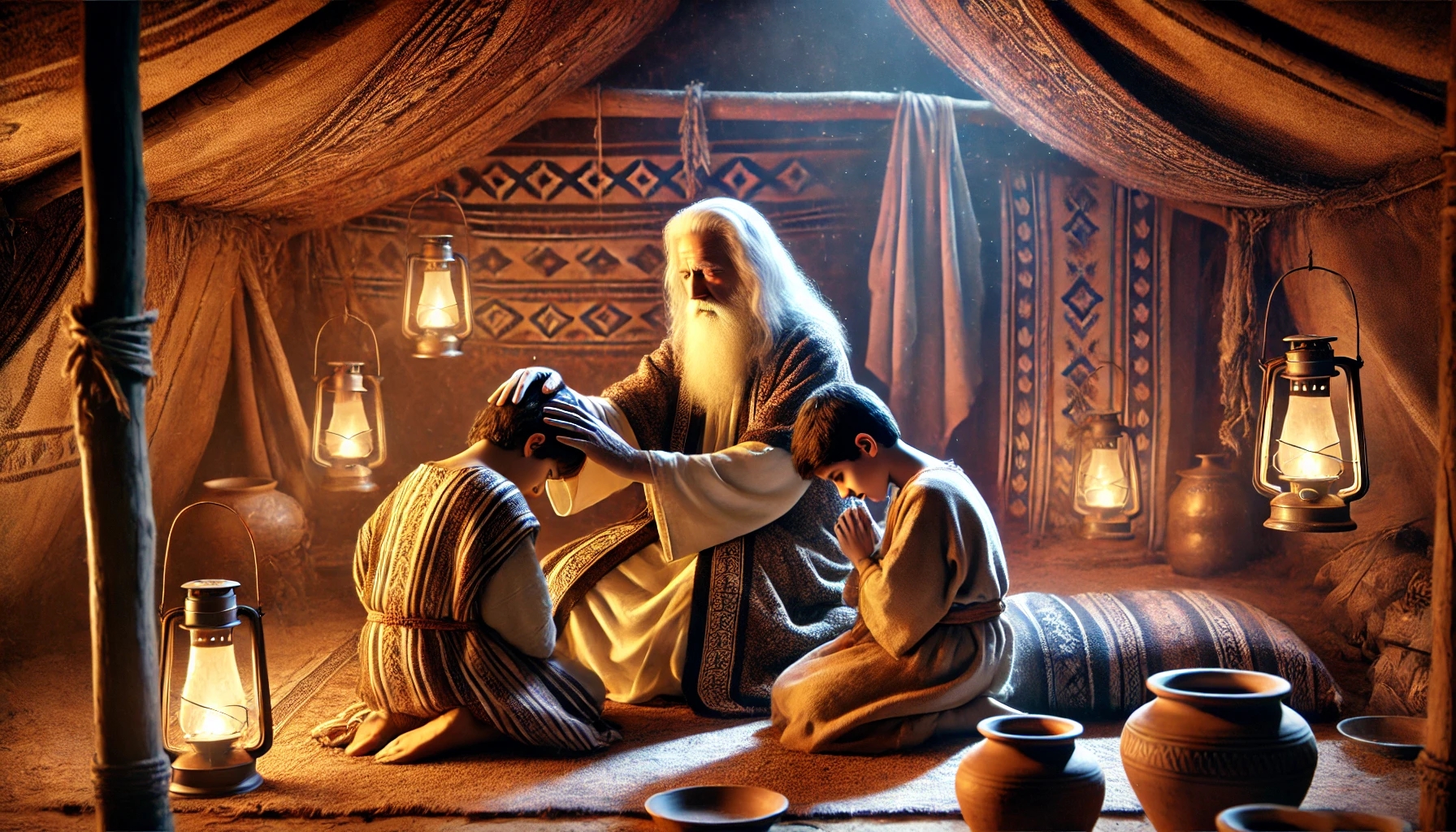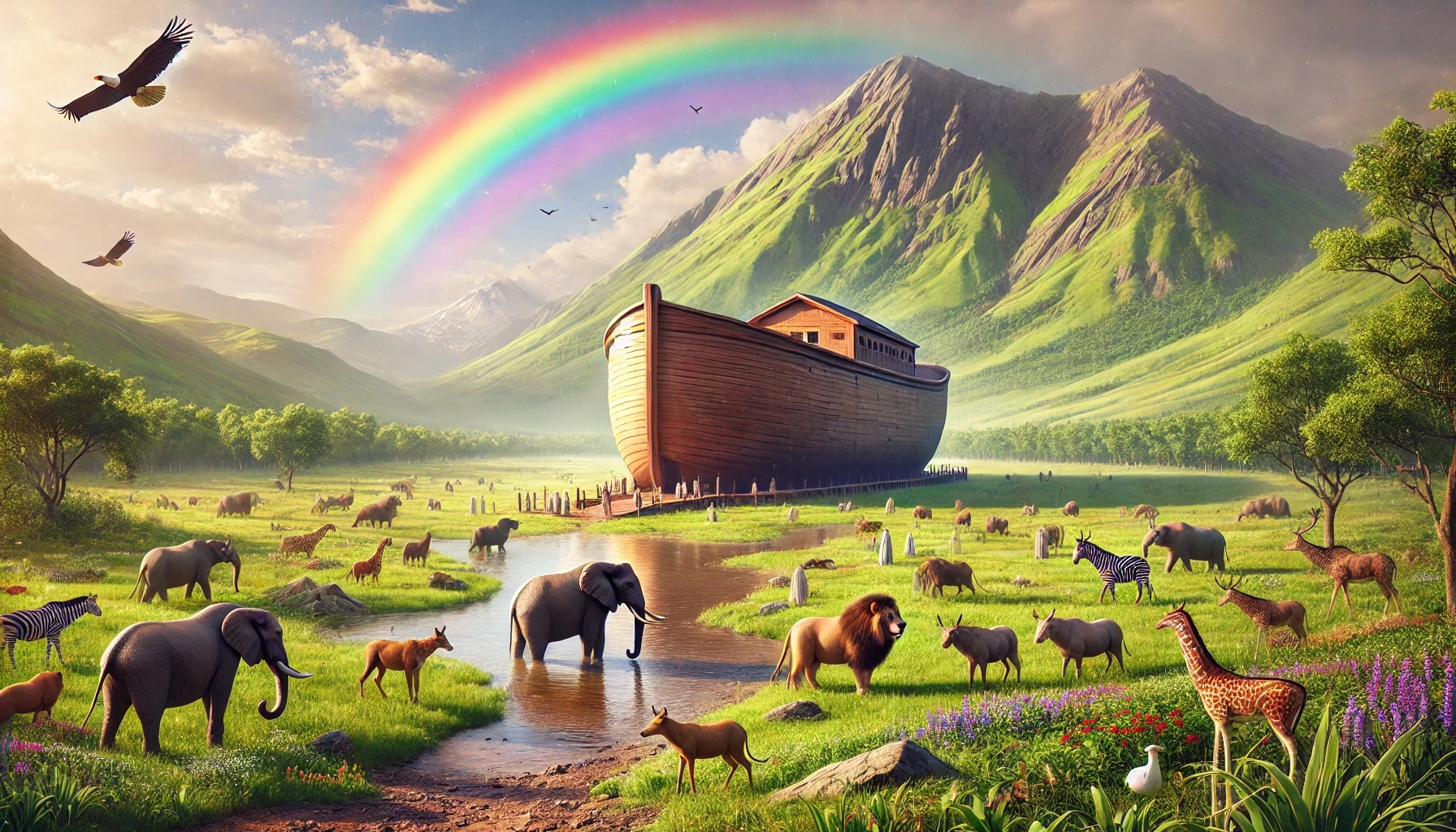
📅 June 3, 2025
📖 DAILY BIBLE READING
✨ Genesis 48 – Jacob’s Blessing over Ephraim and Manasseh – God’s Ways Are Higher Than Ours
🌍 When God Chooses the Unexpected: The Younger Becomes Greater Than the Firstborn
══════════════════════════════════════════════
📜 Bible Text – Genesis 48 (KJV)
1 And it came to pass after these things, that one told Joseph, Behold, thy father is sick: and he took with him his two sons, Manasseh and Ephraim.
2 And one told Jacob, and said, Behold, thy son Joseph cometh unto thee: and Israel strengthened himself, and sat upon the bed.
3 And Jacob said unto Joseph, God Almighty appeared unto me at Luz in the land of Canaan, and blessed me,
4 And said unto me, Behold, I will make thee fruitful, and multiply thee, and I will make of thee a multitude of people; and will give this land to thy seed after thee for an everlasting possession.
5 And now thy two sons, Ephraim and Manasseh, which were born unto thee in the land of Egypt before I came unto thee into Egypt, are mine; as Reuben and Simeon, they shall be mine.
6 And thy issue, which thou begettest after them, shall be thine, and shall be called after the name of their brethren in their inheritance.
7 And as for me, when I came from Padan, Rachel died by me in the land of Canaan in the way, when yet there was but a little way to come unto Ephrath: and I buried her there in the way of Ephrath; the same is Bethlehem.
8 And Israel beheld Joseph’s sons, and said, Who are these?
9 And Joseph said unto his father, They are my sons, whom God hath given me in this place. And he said, Bring them, I pray thee, unto me, and I will bless them.
10 Now the eyes of Israel were dim for age, so that he could not see. And he brought them near unto him; and he kissed them, and embraced them.
11 And Israel said unto Joseph, I had not thought to see thy face: and, lo, God hath shewed me also thy seed.
12 And Joseph brought them out from between his knees, and he bowed himself with his face to the earth.
13 And Joseph took them both, Ephraim in his right hand toward Israel’s left hand, and Manasseh in his left hand toward Israel’s right hand, and brought them near unto him.
14 And Israel stretched out his right hand, and laid it upon Ephraim’s head, who was the younger, and his left hand upon Manasseh’s head, guiding his hands wittingly; for Manasseh was the firstborn.
15 And he blessed Joseph, and said, God, before whom my fathers Abraham and Isaac did walk, the God which fed me all my life long unto this day,
16 The Angel which redeemed me from all evil, bless the lads; and let my name be named on them, and the name of my fathers Abraham and Isaac; and let them grow into a multitude in the midst of the earth.
17 And when Joseph saw that his father laid his right hand upon the head of Ephraim, it displeased him: and he held up his father’s hand, to remove it from Ephraim’s head unto Manasseh’s head.
18 And Joseph said unto his father, Not so, my father: for this is the firstborn; put thy right hand upon his head.
19 And his father refused, and said, I know it, my son, I know it: he also shall become a people, and he also shall be great: but truly his younger brother shall be greater than he, and his seed shall become a multitude of nations.
20 And he blessed them that day, saying, In thee shall Israel bless, saying, God make thee as Ephraim and as Manasseh: and he set Ephraim before Manasseh.
21 And Israel said unto Joseph, Behold, I die: but God shall be with you, and bring you again unto the land of your fathers.
22 Moreover I have given to thee one portion above thy brethren, which I took out of the hand of the Amorite with my sword and with my bow.
══════════════════════════════════════════════
🔵 Introduction
Genesis 48 presents a deeply moving moment in Jacob’s (Israel’s) life: on his deathbed, he calls his beloved son Joseph to bless Joseph’s two sons—Ephraim and Manasseh. But the blessing does not go as Joseph expects. Through Jacob, God reveals that His choices often go beyond human logic. This scene is not only historically important, but it also contains a rich spiritual lesson about grace, divine selection, and God’s leading.
══════════════════════════════════════════════
🟡 Commentary
1. Joseph Visits His Father (vv. 1–2):
When Jacob falls ill, Joseph rushes to him with his sons. This moment reflects family love but also spiritual significance. Jacob strengthens himself—spiritually, not physically—to pass on the blessing.
2. Jacob Recalls God’s Promises (vv. 3–4):
Jacob recounts God’s appearance in Luz (Bethel), affirming God’s promises: growth, fruitfulness, a great people, and the promised land. He begins his blessing not with emotion but with God’s Word—the true foundation of every spiritual inheritance.
3. Ephraim and Manasseh Become Jacob’s Sons (vv. 5–7):
Jacob symbolically adopts the two sons of Joseph as his own—”like Reuben and Simeon.” This gives them full inheritance rights, a picture of spiritual adoption: God includes us in His family even though we originally did not belong.
4. Meeting the Grandsons (vv. 8–12):
Jacob asks, “Who are these?”—a symbolic moment, as if opening the gateway to blessing. He recognizes God’s faithfulness not only in seeing Joseph again but also his offspring. It is a testimony of divine mercy.
5. The Crossing of Hands (vv. 13–14):
Joseph positions his sons according to birth order—Manasseh on Jacob’s right (the firstborn’s place). But Jacob deliberately crosses his hands: the right hand on Ephraim, the younger. This was intentional—led by God’s Spirit.
6. The Blessing (vv. 15–16):
Jacob gives a threefold blessing:
-
From the God of his fathers,
-
From the God who shepherded him,
-
From the Angel who redeemed him from all evil.
A complete picture of God’s work: past, present, and as the Deliverer from harm.
7. Joseph Objects (vv. 17–19):
Joseph tries to correct his father, assuming he made a mistake. But Jacob responds, “I know, my son, I know.” Human tradition (firstborn priority) does not always reflect God’s choice. God’s election follows His own wisdom.
8. A Blessing for All Israel (v. 20):
“May God make you like Ephraim and Manasseh!” – This becomes the standard blessing in Israel. The younger is placed before the older—a prophetic image of God’s grace choosing according to His purpose, not merit.
9. Jacob’s Final Promise to Joseph (vv. 21–22):
Jacob speaks of his approaching death, but also of God’s promise to bring Israel back to the promised land. He gives Joseph an extra portion of land—prophetic of future conquest.
══════════════════════════════════════════════
🟢 Summary
Genesis 48 is a powerful scene of faith and prophecy. Jacob, near death, reflects on God’s faithfulness and speaks blessings over the next generation. Though Joseph expects Manasseh to receive the greater portion, God reveals through Jacob that Ephraim—the younger—will become the greater nation. This blessing is deliberate and spiritually guided, not driven by human logic. It exemplifies the principle: God’s ways are higher than our ways.
══════════════════════════════════════════════
🔴 Message for Today
-
God does not see as humans do. He chooses not according to rank, performance, or expectation, but according to His own counsel.
-
Even if we seem “second in line,” God may have great plans for us. Ephraim was the younger, yet God exalted him—because He willed it.
-
Spiritual blessings extend across generations. Jacob’s words were not just for that moment—they became a lasting pattern for all Israel.
-
In crisis, we should act like Jacob—speaking in faith, not swayed by emotion. On his deathbed, Jacob testified with clarity to God’s faithfulness.
~~~~~🌍~~~~~

📆 June 1 – 7, 2025
📆 WEEKLY SPIRIT OF PROPHECY READING
📖 Ellen G. White │ Patriarchs and Prophets – Chapter 8
✨ After the Flood
📖 Read online here
══════════════════════════════════════════════
🔵 Introduction
The flood was over. The waters receded, and the ark came to rest. But life after the flood was not simply a continuation—it was a complete new beginning. In Chapter 8 of Patriarchs and Prophets, we read how God not only saves but also leads, protects, and grants new promises. Noah, the faithful preacher of righteousness, stands as a shining example of obedience, gratitude, and trust—even in times of deep uncertainty. The world that awaited him was no longer the same—but God had not changed: faithful, powerful, and full of grace.
══════════════════════════════════════════════
🟡 Commentary
1. Faith in the Test (The Months in the Ark)
The five months spent in the ark were a hard trial of patience. Without knowing when the waters would recede, Noah remained steadfast. He did not doubt God’s leading. Faith carried him and his family through the darkness.
Lesson: True trust is shown in the silence of waiting. God’s hand guides even when we cannot see it.
2. The Ordered Return (The Birds and Patience)
Noah sent out the raven and the dove in search of a sign. But he did not act impatiently—he left the ark only when God explicitly commanded him.
Lesson: Even when we see signs, our decisions must be guided by God’s word, not by circumstances alone.
3. The First Altar (Gratitude and Sacrifice)
Before he built a home for himself, Noah built an altar for God. He offered clean animals—an expression of his faith in the coming sacrifice of Christ.
Lesson: True gratitude first honors the One who gave everything—even when our own resources are scarce.
4. God’s Response: The New Covenant
God smelled the “pleasing aroma” of the sacrifice and declared a new covenant: there would be no more global flood. The rainbow became the sign of this covenant.
Lesson: God uses visible signs to assure us of His invisible faithfulness. His promises are for all generations.
5. A Changed Earth, A Changed Lifestyle
The earth was completely altered—landscape and ecosystem. God permitted the eating of meat as an adaptation to the new reality.
Lesson: God’s care and instructions adapt to human situations, but His moral will remains unchanged.
6. Hidden Treasures and Judgment
The flood buried not only bodies but also human pride, wealth, and idolatry. From this came coal, oil, and ore—evidence of God’s judgment but also of His mercy.
Lesson: What man abused, God transformed into a testimony of His power and justice.
7. Future Judgments: Fire Instead of Water
As water once cleansed the earth, so fire will purify it at the end. Volcanoes, earthquakes, and disasters are forerunners of Christ’s return.
Lesson: God’s warnings are not meant to frighten but to call us to repentance—His grace protects His people.
8. God’s Protection for His Own
Just as Noah was safe in the ark, God’s people will be protected by His power at the end. Psalm 91 becomes a personal promise amid chaos.
Lesson: The safe place is not geographical, but spiritual—under God’s wings.
══════════════════════════════════════════════
🟢 Summary
After the flood, Noah stepped into a radically changed world. But in the midst of death and destruction, his heart remained focused on God. His obedience, gratitude, and faith make him a model for all generations. And God responded with grace, promise, and protection. The rainbow stretching across the sky and throne remains the eternal sign: God’s covenant stands. And though future judgments will come, He will preserve those who trust in Him.
══════════════════════════════════════════════
🔴 Message for Us Today
In a world again marked by uncertainty, disasters, and moral decay, God calls us to live like Noah: with faith, obedience, and gratitude. When all that we know is shaken, we can rest assured:
God’s hand is still at the helm.
His covenant still stands. The rainbow in the sky is more than a natural phenomenon—it is a testimony of His faithfulness. And just as Noah was preserved in the midst of judgment, so we too can know:
The righteous are safe—not because they are strong, but because they trust in God.
So then, let us build altars of gratitude before we build houses. Let us give before we take. Let us believe before we see.
For the Lord, your Redeemer, says:
“My kindness shall not depart from you.” (Isaiah 54:10)
~~~~~🌍~~~~~

📆 June 1 – 7, 2025
📆 WEEKLY SPIRIT OF PROPHECY READING
📖 Ellen G. White │ Patriarchs and Prophets – Chapter 9
✨The Literal Week
📖 Read online here
══════════════════════════════════════════════
🔵 Introduction
The division of the week into seven days goes directly back to Creation: six days of work and one day of rest. In Chapter 9 of Patriarchs and Prophets, Ellen G. White explains how this divine principle was established in the Creation narrative and reaffirmed in the Law at Sinai. At the same time, she warns against modern misconceptions that stretch the Creation week into indefinite periods and thereby undermine the Fourth Commandment.
🟡 Commentary
1. Biblical Foundation of the Seven-Day Week
1.1 Creation Days as Literal Days
-
- Each Creation day consisted of an evening and a morning and was no different from our present days.
- God created for six days; on the seventh He rested, blessed, and sanctified that day as the Sabbath.
1.2 Confirmation at Sinai
-
- The Fourth Commandment refers directly to God’s own work of Creation (Exodus 20:8–11).
- This clear rationale underscores the literal meaning of a seven-day week.
2. Critique of Unbiblical Time Interpretations
2.1 Geological Theories vs. the Creation Account
-
- Geologists find fossil remains of large creatures and often interpret them as evidence for long ages of Earth’s history.
- White argues that many discoveries are remains of pre-Flood beings and do not contradict the biblical week.
2.2 Error and Unbelief
-
- Expanding the Creation days into indeterminate ages obscures the clear command of God.
- Satan’s aim is to blur the Fourth Commandment and stir rebellion against divine authority.
3. Harmony of Science and Revelation
3.1 Limits of Human Science
-
- Natural science cannot fully explain God’s creative activity.
- True education and research lead not to doubt but to obedience to God’s Word.
3.2 The Book of Nature and the Written Word
-
- Both complement each other: discoveries in nature and in Scripture affirm God’s power.
- Science without a biblical foundation drifts “without chart or compass” on unknown seas.
🟢 Summary
Ellen G. White emphasizes that the seven-day week begins with literal days in Creation and is confirmed by the Law at Sinai. Modern geological theories that assign vast, undefined periods to the Creation days contradict the clear biblical account. Science and revelation do not conflict, provided research remains within the framework of Holy Scripture.
🔴 Message for Us Today
The Fourth Commandment reminds us of God’s authority as Creator and highlights the importance of regular rest. In an age when scientific theories often extend beyond the Bible, we should always measure our understanding against God’s Word. Observing the Sabbath can renew our strength and bolster our faith.




















